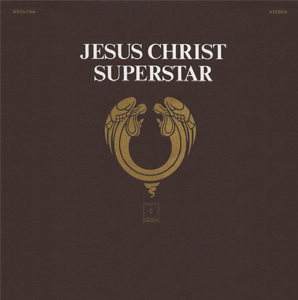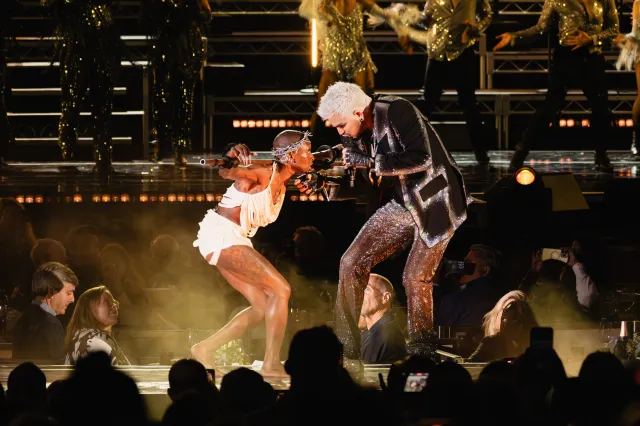A Short Dive into The Hollywood Bowl Production of Jesus Christ Superstar and the Implications thereof
Jesus Christ Superstar is a rock opera musical retelling the story of Jesus’ crucifixion from the perspective of the man that betrayed him, Judas Iscariot. I was not raised Christian and I have never done a personal deep dive into most of the stories told from the bible so my basis for this writing is the cultural knowledge surrounding one of the most influential religions in human history and the general pop culture knowledge your average consumer might possess. I claim no authority or knowledge of the actual Bible verses detailing and depicting the life of Jesus and his eventual death.
With the preamble out of the way, I LOVE this musical. Andrew Lloyd Webber generally produces a level of popular musicals that I don’t love, Cats and Phantom of the Opera are nowhere near my top 50 musicals. With that said, Jesus Christ Superstar is not only incredibly catchy but is written in a way to allow an incredibly wide variety of retellings under different pretenses. For instance, the original 1970’s movie is told through two different narrative lenses; through the lens of Judas and his characters arc surround betraying Jesus and through the lens of an acting troupe putting on a show. The movie starts with all of the characters in 1970’s regalia leaving a van and dressing into their roles costuming. This narrative framing can allow for modern iterations of the production to place more modern cultural and political contexts on the show without compromising the actual content of the show.
The 2012’s arena tour of the production with Tim Minchin as Judas shows the show in the context of the 2008 housing crisis, showing the followers of Jesus as impoverished and clearly trying to find hope in hard times through devoting themselves to Jesus’ righteous cause. This can also be followed to the NBC Live show with John Legend portraying Jesus in a time of the Black Rights movement. All of these shows have had controversy surrounding these choices as commentary on active political culture can cause a stir. No other production has ever cast Jesus as a woman, much less a black woman, until now.
The Hollywood Bowl production of the show from 2025 has cast Cynthia Erivo as the titular Jesus, and an openly gay pop star (Adam Lambert) as Judas. These choices are strong, offering a mix up to their characters. Making Jesus, the King of men, portrayed as a woman harkens to the current generations' distaste for labels and a modern defiance towards the status quo. This is paired with Adam Lambert's Judas portrayal, continuing to humanize and portray gay characters as multi dimensional and still flawed human beings.
Judas is the main character we see JCS through, he is the audience lens as we watch Jesus approach his oncoming demise. Judas is portrayed as a genuinely kind person throughout the show, changing it up from the biblical portrayal of him being a straight up traitor or being possessed/seduced by Satan into betraying Jesus. He yells at Jesus when he feels he is getting lost in the fame and admiration of the people, using expensive oils on himself instead of selling it and giving the money to the more needy. He clearly loves Jesus, platonically or familiarly or romantically is up to interpretation and your desired level of blasphemy, and absolutely despises that Jesus seems to have lost the characteristics that Judas once loved him for.
Jesus on the other hand is portrayed throughout the musical as arrogant, privy to human faults like anger and fear, in a way that many may feel is blasphemous. The 1970’s film portrays Jesus as a man losing himself under the weight of God's expectations, not even sure if it is worth it to follow through on his death. Gethsemane is a song that portrays Jesus as fearful, he is but human and doesn’t want to die if it won’t actually do any good. It portrays a level of faith in an unknown and allows for the emotions to be felt. This Jesus doesn’t know if he is the son of God, meant to die for humanities sins. He can’t be sure that his story would be the record breaker of a tale that it clearly has become. This humanization of Jesus doesn’t ever really lose his good natured faith and kindness however.
There are two minor changes in the HB JCS production that make major changes to the portrayal of Jesus throughout the film. The first in the general entrance and demeanor that Cynthia gives Jesus. Almost always Jesus starts off the show by being with everyone else, not hidden from the group. He is one of them, an actor putting on a production or a fellow protestor on the capitol hill. He is never hidden and then revealed in a holier than though manner, except for in the HB JCS production. This show has Jesus step onto stage midway through the Overture, in a shawl and bright white dress. He appears through a glowing and blinding beam of light, in the shape of a cross of course, and everyone around kneels for him as he appears. This portrayal immediately creates a different atmosphere. Jesus is above the disciples, not one of them. He is ostensibly far more selfish in this portrayal than he ever has been.
That selfish portrayal can be further seen in the song, The Temple, where Jesus is usually shown to have his first bout of anger, tearing through the temple market and destroying it as it twists the sanctity of the space into a house of sin. Jesus then goes away and is found by the lepers who demand he heal their ailments and perform divinity for them. Jesus always is reaching to try and help them, showing his kindness and desire for good things despite them overwhelming him with demands. Cynthia’s Jesus however does not ever reach to heal any of them throughout the song. She is crowded and shrinks away from them, overwhelmed but not because she can’t help them but because she is afraid she cannot help them and doesn’t even try. I like to think this portrayal of Jesus has been putting up a front, Cynthia's small stature and frame allowing for her to portray Jesus as someone who does not have the ability to help. She is marginalized as a black woman in our society. I cannot speak for her or the marginalized black community, but my personal experiences as a woman lead me to putting on masks of confidence and strength in situations where I do not feel that way and I view Cynthia’s Jesus as doing the same thing.
This portrayal of Jesus is unlike anything I have ever seen from this show and I strongly look forward to hopefully a proshot of the production so I can further analyze the camera focus and how the open air set allows for more meaningful connections to the audience members watching the production.


